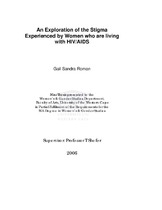An exploration of the stigma experienced by women who are living with HIV/AIDS
Abstract
The effects of the spread of HIV/AIDS place a great burden on women and children, who will probably suffer most in terms of social and economic deprivation. Since HIV/AIDS is linked to social taboos such as sexuality, drug use and death, there are enormous levels of ignorance, denial, fear and intolerance in most communities. These prejudices lead to the stigmatisation and discrimination of people who are living with HIV/AIDS. Moreover the illness, as it is sexually transmitted, has been conflated with sexual excess, lack of morals, and those already stigmatised such as sex workers with associated discourses of blame, shame and guilt. Generally, responses to HIV and those living with HIV have served to reflect, legitimise and reproduce broader social inequalities on the basis of sexual orientation, gender, race and class. Stigma is the reason why many people who are living with HIV/AIDS, choose not to disclose their status and seek apposite assistance. This study explored the stigma experienced by a group of women who are living with HIV/AIDS and to develop a deeper understanding of whether these experiences are complicated by social responses.

